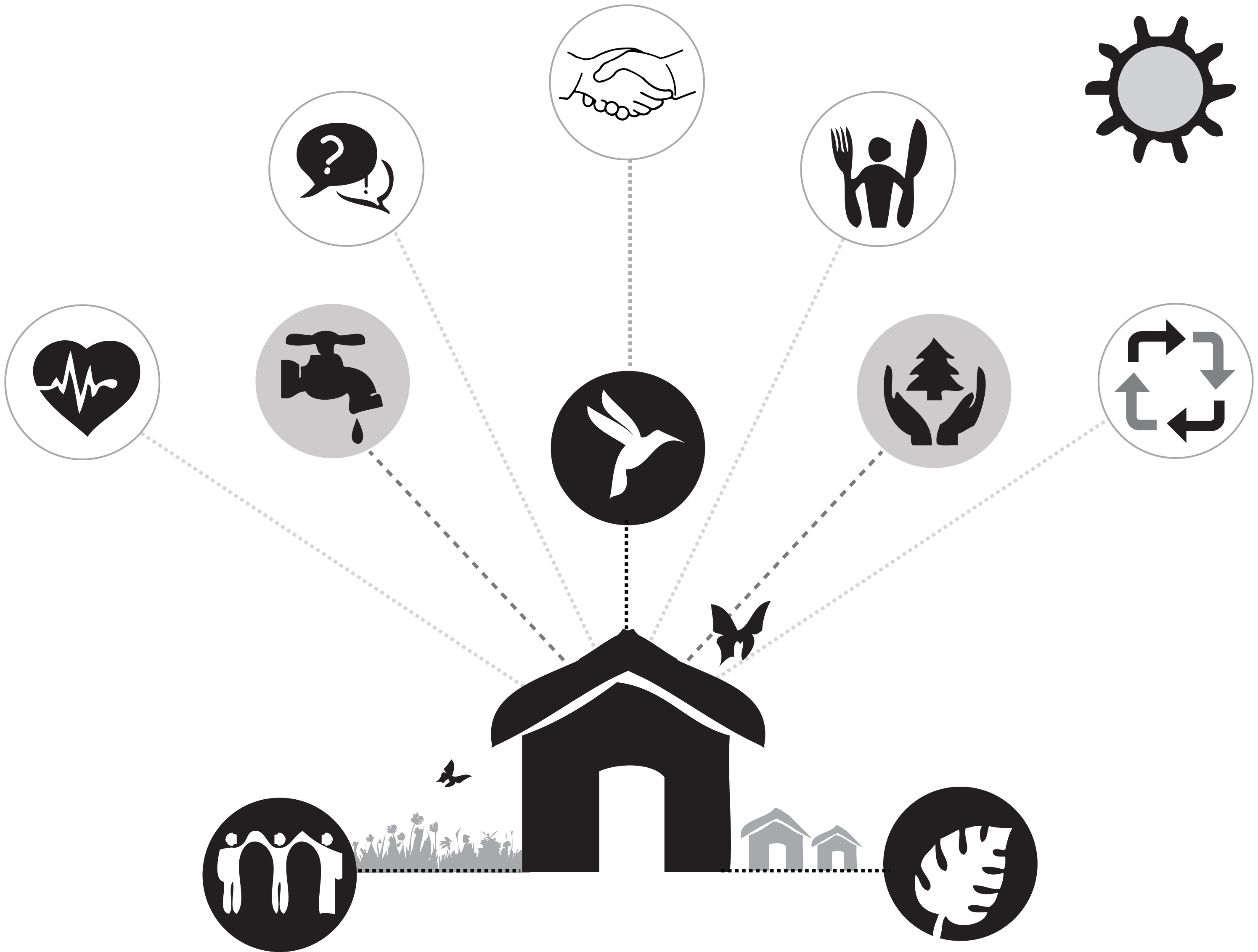Ecological Justice

Overview
By taking a radical look at the origins of the terms ecology, ecological justice, and/or economy, we are able to build a language for communities that are striving to move a unified vision and strategy for ecological justice and a Just Transition towards local, living, loving economies. We believe it is foundational to understand the reorientation to economy and ecology, and the definition of ecological justice, as introduced through this framework. You can also find this framework as a curriculum tool in our curriculum manual Propagate, Pollinate, Practice.


Eco Means Home
ECO SYSTEM (“home” + “system”)
Ecosystem means all the relationships in a home – from microorganisms, plants, animals and people to water, soil and air. An Ecosystem includes the terrain and the climate. An Ecosystem is not simply a catalogue of all the things that exist in a place; it more importantly references the complex of relationships. An ecosystem can be as small as a drop of rain or as large as the whole planet. It all depends on where you draw the boundaries of home.
ECO LOGY (“home” + “knowledge”)
Ecology means knowing, reading and understanding home – and by definition, the relationships of home.
ECO NOMY (“home” + “management”)
Economy means management of home. How we organize our relationships in a place, ideally, to take care of the place and each other. But “management of home” can be good or bad, depending on how you do it and to what ends. The purpose of our economy could be turning land, life and labor into property for a few, or returning land, life and labor into a balanced web of stable relationships.
Economy does not mean money, or exchange or financial markets, or trading or Gross Domestic Product. These are simply elements or tools of specific economies. Economies (“how we manage our home”) can be measured in many ways: How healthy are the soil, people, water, animals? How much wealth is generated? Who owns the wealth? What even constitutes wealth? Is it money? Well-being? Happiness?
All economic activity has ecological consequences. That doesn’t mean that those consequences are always bad. The economic activity of peoples who have developed long relationships with the ecosystems they are a part of have tended towards balance. This traditional evolved knowledge of place is held in language, food, culture and story.
Other human communities have mismanaged home, and have created ecological consequences that are not beneficial to a sustainable relationship with the web of life. But when a people outstrip their resource base, or create damage to an ecosystem in such a way that it can no longer sustain them, they move on or die off – hopefully learning some lessons. Mother Earth has been sufficiently resilient to recover from these paper-cuts. But…
If you globalize the economy, you globalize the ecosystem. The scale and pace of globalization combined with the power imbalance in decision-making has made it virtually impossible for people to read and respond to the changes fast enough – and in fact, we have not. If you globalize the ecosystem and you have a destructive economy (mismanagement of home) then the consequences can be big. Very Big.
The current globalized economy is compromising the life support systems of the planet: destroying biodiversity, exploiting labor, killing cultures, polluting water and disrupting the atmospheric-hydrologic cycle.
ECOLOGICAL JUSTICE (“home” + “justice”)

LA PALABRA ‘ECO’ DERIVA DE LA PALABRA GRIEGA ‘OIKOS’ CUAL SIGNIFICA ‘HOGAR.’
ECO SISTEMA (“hogar” + “sistema”)
El Ecosistema significa todas las relaciones en un Hogar – desde microorganismos, plantas, animales y personas a el agua, suelo y aire. Un Ecosistema incluye terreno y clima. Un Ecosistema no es simplemente un catalogo de todo lo existente en un lugar; esto, más importantemente, se refiere al complejo de las relaciones. Un Ecosistema puede ser tan pequeño como una gota de lluvia o tan grande como el planeta entero. Esto depende de donde creas los límites del hogar.
ECO LOGÍA (“hogar” + “conocimiento”)
La Ecología significa conocer, interpretar y entender el hogar – y por definición, las relaciones del hogar.
ECO NOMÍA (“hogar” + “administración”)
La Economía significa el manejo/la administración del hogar. Es como organizamos nuestras relaciones en un lugar. Pero “el administro del hogar” puede ser bueno o malo, dependiendo en como se lleva a cabo, y con qué propósito. El propósito de nuestra economía podría ser convertir a la tierra, vida y labor en la propiedad privada de unos pocos, o transformar tierra, vida y labor en una red equilibrada de relaciones estables.
La Economía no significa dinero, o intercambio de mercados financieros, o comercio o Producto Interior Bruto. Estos son simplemente elementos o herramientas de economías específicas. Las Economías (“como administramos nuestro hogar”) puede medirse en varias maneras: ¿Qué tan fértil es el suelo, la gente, el agua, los animales? ¿Cuánta riqueza es generada?¿Quién posee la riqueza? ¿Qué constituye la riqueza? ¿El dinero? ¿bienestar? ¿felicidad?
Todas actividades económicas tienen consecuencias ecológicas. Esto no significa que dichas consecuencias siempre son malas. La actividad económica de los pueblos que han desarrollado relaciones históricas y duraderas con los ecosistemas a las que pertenecen tienden hacia el balance. Este conocimiento evolucionado tradicional del hogar se sustenta a través del lenguaje, alimento, cultura e historia.
Otras comunidades humanas han administrado mal el hogar, y han creado consecuencias ecológicas no beneficiosas a una relación sustentable con la red de vida. Pero cuando un pueblo sobrepasa su base de recursos, de tal modo que ya no los puede sustentar, siguen otro camino o desaparecen – con la esperanza de haber aprendido algunas lecciones. La Madre Tierra ha sido suficientemente resistente en recuperarse de estas heridas. Pero…
Si se globaliza la economía, se globaliza el ecosistema. La escala y el paso de la globalización combinado con el poder del desequilibrio en la toma de decisiones ha hecho virtualmente imposible que el pueblo interprete y responda a los cambios suficientemente rápido – y de hecho, no lo hemos logrado. Si el ecosistema se globaliza, y con una economía destructiva (mala administración del hogar) las consecuencias son grandes. Muy grandes.
La economía globalizada compromete los sistemas de apoyo de vida del planeta: destrucción de la biodiversidad, explotación de trabajo, destrucción de culturas, contaminación del agua e interrupción del ciclo atmosférico hidrológico.
JUSTICIA ECOLÓGICA (“hogar” + “justicia”)
Justicia ecológica es el estado de equilibrio entre comunidades humanas y ecosistemas sanos basado en prosperidad, relaciones mutuamente beneficiosas y participación en auto gobernación. Vemos la Justicia Ecológica como el marco clave para captar nuestra visión holística de un mundo mejor – un mundo basado en el buen vivir.
